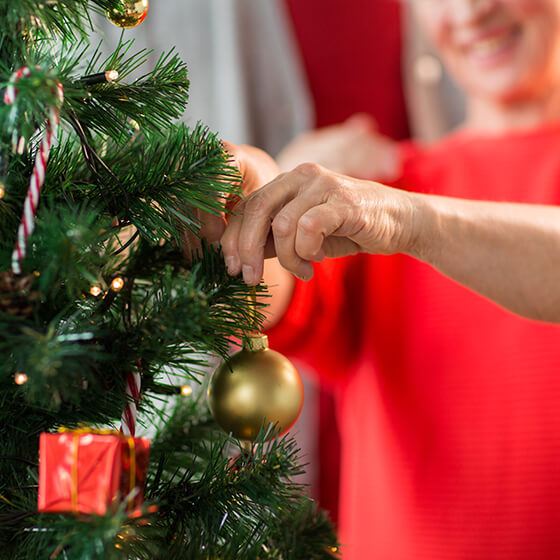The holiday season is full of light and love. You may decorate your homes with strings of lights, light the candles of the menorah or wait with bated breath for Santa Claus to find his way down your chimney. We connect with old friends and spend quality time with them and lean into the warm embrace of family. However, while the joys of the holidays may be affected by your local health procedure, helping keep the community safe is the best gift you can give and receive this year. Ensure that you are informed of your local government health protocols and following them appropriately because your local health experts will be the best source of advice for keeping you and your family safe. The following are general guidelines that are dependent on your specific situation. You and your elderly loved one will have to use this information and apply, as necessary.
Most medical experts and government health agencies state that households should not mix outside their social bubble. However, depending on your specific area there may be a stricter policy. As well, if you are considering visiting an elderly loved one, then you will need to be more mindful of your contamination hazards. Seniors are at high risk regarding COVID-19, and seniors with health conditions are even more vulnerable. Elders who have lung conditions that may require extra oxygen are particularly at risk because COVID-19 negatively impacts the lungs. Elders with heart-based conditions as well as those with diabetes and cancer are also at high risk to COVID-19. Therefore, you will need to be mindful of whether you should make the trip to see elders with health conditions in person, because the risk may outweigh the benefits.
If your local community has low cases of COVID-19 you may be able to visit your elderly loved one. However, you should look up their local travel guidelines to ensure you are not crossing borders into cities or provinces with different border control and travel bans than your home city. You may be required to submit a COVID-19 test to clear you for travel. As well, if you can travel to see them, consider the travel method appropriate for the journey. Public transit can be a great way to get around, however, it will also put you more at risk than private transit. It is safer to travel by car than it is to travel by buses, trains, or airplanes. Based on the local guidelines, you may be asked to quarantine for 14 days after traveling, when you arrive, as well as when you return home. Consider the time investment when traveling and whether quarantine is possible for you. Quarantining before and after travel is one way to keep your elderly loved one, and your local community safe from COVID-19.
When visiting elderly loved ones, it is advised to stay in a hotel to minimize time spent and contagions passed during visits. It is helpful to take extra precautions during your visits as well, such as wearing masks, physical distancing, and washing hands often. Outdoor visits may be chilly, but they are also a safer option than going inside because of the increased airflow. Additionally, while making and sharing food is a traditional family custom, this year it would be safer to bring and eat your food and forgo sharing. By decreasing the level of contagion sharing between your family and your elderly loved one you minimize the risk of catching the virus.
Whilst this year and this holiday season may be fraught with anxiety, the holidays should be bringing you peace and joy, not adding to your stress load. There are many ways to connect virtually to your elderly loved one including video conferencing, phone calls, and sending letters. These distance visits will bring love and light to their holiday season without the risk of contagion. Ensure that you are researching local health and safety guidelines while making decisions around holiday visits. Have a safe and happy holiday season!
We also recommend you check these related posts in our Home Care Services blog:

